Where is Canada going .. does Pierre Trudeau’s new grandson have anything to do with it?
Jan 5th, 2007 | By Dominic Berry | Category: Ottawa Scene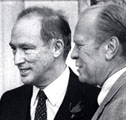 THURSDAY, JANUARY 4, 2007. The Globe and Mail‘s news of the birth of Pierre- Emmanuel Trudeau, “two weeks ago in a Montreal hospital,” has a perhaps appropriate certain formality to it. Now we the Canadian people know, in any case, that the son of Alexandre Trudeau and Zoe Bedos was born on December 22, 2006. And he celebrated his first Christmas “at the Pine Avenue Art Deco mansion of his famous grandfather.” Meanwhile, back in Ottawa news also surfaced on Thursday, January 4 about minority Conservative prime minister Stephen Harper’s first cabinet shuffle. The question some will be asking is which of these two events has more to do with the big Canadian future? And it may say something about something that the answer is not entirely clear (even allowing for the latest defection of Toronto-area Liberal Wajid Khan to the Conservative ranks).
THURSDAY, JANUARY 4, 2007. The Globe and Mail‘s news of the birth of Pierre- Emmanuel Trudeau, “two weeks ago in a Montreal hospital,” has a perhaps appropriate certain formality to it. Now we the Canadian people know, in any case, that the son of Alexandre Trudeau and Zoe Bedos was born on December 22, 2006. And he celebrated his first Christmas “at the Pine Avenue Art Deco mansion of his famous grandfather.” Meanwhile, back in Ottawa news also surfaced on Thursday, January 4 about minority Conservative prime minister Stephen Harper’s first cabinet shuffle. The question some will be asking is which of these two events has more to do with the big Canadian future? And it may say something about something that the answer is not entirely clear (even allowing for the latest defection of Toronto-area Liberal Wajid Khan to the Conservative ranks).
A real Canadian royal family at last … just a clone of the Kennedys … or remember the grandson of William Lyon Mackenzie?
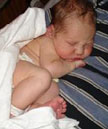 To start with, it seems in keeping with what his famous grandfather was at least popularly thought to stand for, among both friends and enemies, that Pierre-Emmanuel Trudeau was, technically speaking (and on the faded old lexicon), born out of wedlock.
To start with, it seems in keeping with what his famous grandfather was at least popularly thought to stand for, among both friends and enemies, that Pierre-Emmanuel Trudeau was, technically speaking (and on the faded old lexicon), born out of wedlock.
It is now being reported that Alexandre (a.k.a. Sacha) Trudeau and Zoe Bedos actually will be married this summer. And that, you might guess, is what Pierre-Emmanuel’s famous but still conventionally Catholic grandfather would finally want – even if it is also public knowledge nowadays that Pierre Elliott Trudeau fathered a child out of wedlock himself.
In any event Zoe Bedos remains rather mysterious. And this can even seem almost deliberately cunning, on, e.g., General de Gaulle’s theory that mystery is important in maintaining the integrity of a compelling public figure.
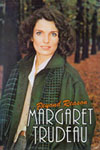 We know that Ms. Bedos was introduced to Alexandre Trudeau by his sister-in-law Sophie Gregoire, who married Alexandre’s older brother Justin in the spring of 2005, at the church of Sainte-Madeleine d’Outremont in Montreal. Just this past summer we learned that she was expecting Alexandre’s child, and not much more. Now we have been additionally informed that Zoe Bedos’s parents as well as Zoe herself were present at Alexandre’s Pine Avenue Art Deco mansion over the year-end holidays of 2006, to help celebrate the birth of Pierre-Emmanuel (along with Justin and Sophie, the boys’ sometimes notorious mother Margaret, and her mother too, from beautiful BC, where Margaret herself was born and raised).
We know that Ms. Bedos was introduced to Alexandre Trudeau by his sister-in-law Sophie Gregoire, who married Alexandre’s older brother Justin in the spring of 2005, at the church of Sainte-Madeleine d’Outremont in Montreal. Just this past summer we learned that she was expecting Alexandre’s child, and not much more. Now we have been additionally informed that Zoe Bedos’s parents as well as Zoe herself were present at Alexandre’s Pine Avenue Art Deco mansion over the year-end holidays of 2006, to help celebrate the birth of Pierre-Emmanuel (along with Justin and Sophie, the boys’ sometimes notorious mother Margaret, and her mother too, from beautiful BC, where Margaret herself was born and raised).
The larger and more important question of course is why are we paying attention to all this anyway? You could say, e.g., that the current edition of the Central Canadian media mafia is just lavishing some of the hyperbole it once devoted to the British royal family on the Trudeaus of Montreal, in a vain quest to keep up to date. There is probably some truth to this – and it is almost certainly a better waste of journalists’ time than in the old colonial days.
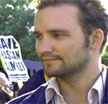 Yet it seems beyond serious dispute that the Trudeaus are not really going to become any official kind of royal family. Whatever does replace the British monarchy in Canada, in the not all that distant future, will have to be considerably more democratic than that – on Pierre Elliott Trudeau’s own essential principles, as most clearly reflected, e.g., in his legacy of the 1982 Canadian Charter of Rights and Freedoms.
Yet it seems beyond serious dispute that the Trudeaus are not really going to become any official kind of royal family. Whatever does replace the British monarchy in Canada, in the not all that distant future, will have to be considerably more democratic than that – on Pierre Elliott Trudeau’s own essential principles, as most clearly reflected, e.g., in his legacy of the 1982 Canadian Charter of Rights and Freedoms.
From here, some will say that the Trudeaus have just become Canada’s version of the Kennedys in the great elephant of the USA – following the insane independent Canadian passion for miniature replicas of everything of consequence in the much vaster and more prominent free and democratic republic next door. Again there is probably some truth to this too. But, like everything else of this sort, it is not really very interesting, at best.
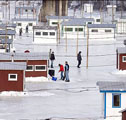 Those with a deeper grasp of Canada’s own history, in the vast northern attic of North America, might want to raise the example of William Lyon Mackenzie King – the most successful of all Canadian prime ministers and leaders of the Liberal Party of Canada, judged by the indisputable raw numbers of years in office. He was the grandson of William Lyon Mackenzie – who led the anglophone Upper Canadian branch of the near-legendary Rebellion of 1837, in vague co-ordination with the francophone Lower Canadian branch led by Louis-Joseph Papineau.
Those with a deeper grasp of Canada’s own history, in the vast northern attic of North America, might want to raise the example of William Lyon Mackenzie King – the most successful of all Canadian prime ministers and leaders of the Liberal Party of Canada, judged by the indisputable raw numbers of years in office. He was the grandson of William Lyon Mackenzie – who led the anglophone Upper Canadian branch of the near-legendary Rebellion of 1837, in vague co-ordination with the francophone Lower Canadian branch led by Louis-Joseph Papineau.
However you look at it, something about Pierre Elliott Trudeau still somehow stands for some kind of almost spiritual Canadian aspiration, rooted in all of bilingualism, multiculturalism, the rugged land, Lord Acton, and the transportation technology of the aboriginal peoples. And whatever this is still attracts more than a few diverse hearts and minds among old and new Canadians alike, and in various parts of the country today.
From a distance it does sometimes seem that Sophie Gregoire has been helping both her husband Justin and his younger brother Alexandre come to grips with their own destinies in such a bright light. Now the late Pierre Elliott Trudeau’s first grandson has been born. And the mother is not Sophie Gregoire, but her friend Zoe Bedos …
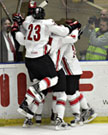 It has all the makings of a good story for the essential tabloid press, whatever else. Even the hard-nosed players who disparaged Justin Trudeau’s dilettante dabbling at the recent leadership convention in Montreal can see that the birth of Pierre Elliott Trudeau’s first grandson has some at least longer-term advantages for the Liberal Party of Canada.
It has all the makings of a good story for the essential tabloid press, whatever else. Even the hard-nosed players who disparaged Justin Trudeau’s dilettante dabbling at the recent leadership convention in Montreal can see that the birth of Pierre Elliott Trudeau’s first grandson has some at least longer-term advantages for the Liberal Party of Canada.
Let all the critics laugh and make bad jokes. Say what you like, etc. This is a kind of fun that none of the old natural governing party’s rivals can match. It will probably not help the Liberals win the next election. But – as foolish as it certainly all is – it does somehow suggest that they really do know how to plan ahead.
[For an update on the latest adventures of Sophie Gregoire, see our May 2007 counterweights report on “Margaret and Sophie in Ethiopia.”]
Meanwhile, back at the cabinet shuffle (and Wajid Khan)
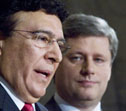 A truly cynical and jaded observer might go so far as to suggest that Liberal gremlins actually planned the official announcement of Pierre-Emanuel Trudeau’s December 22 birth for January 4, to ensure that current Conservative minority prime minister Stephen Harper’s cabinet shuffle did not win any undue public attention.
A truly cynical and jaded observer might go so far as to suggest that Liberal gremlins actually planned the official announcement of Pierre-Emanuel Trudeau’s December 22 birth for January 4, to ensure that current Conservative minority prime minister Stephen Harper’s cabinet shuffle did not win any undue public attention.
Even if this isn’t entirely true, Mr. Harper’s typically clever handiwork may suggest to some that the Liberals should not get too carried away with their enthusiasm for the birth of Pierre Elliott Trudeau’s first grandson. (Canada today is of course not France under Louis XIV – or England under George III, etc – as much as some in darkest Central Canada might wish it still were. And neither Pierre Trudeau nor Stephen Harper were or are at least supposed to be kings, even for just a few or many years in their lives.)
The big move was replacing Rona Ambrose as environment minister with John Baird. On the face of things Mr. Baird does not exactly look like the kind of person environmentalists will trust either. But he is talking about talking with other parties and taking advice from the movement and its allied professionals, etc.
 And then, one day later, it becomes clear that “Toronto-area Liberal Wajid Khan will join the Conservative caucus, strengthening the party’s position in the minority Parliament.” And, the Globe and Mail is saying: “Mr. Khan’s defection brings the minority government ranks to 125 MPs, meaning the Conservatives need only the co-peration of the 29-member NDP caucus to pass legislation.”
And then, one day later, it becomes clear that “Toronto-area Liberal Wajid Khan will join the Conservative caucus, strengthening the party’s position in the minority Parliament.” And, the Globe and Mail is saying: “Mr. Khan’s defection brings the minority government ranks to 125 MPs, meaning the Conservatives need only the co-peration of the 29-member NDP caucus to pass legislation.”
So the duel over the environment has now begun. Mr. Harper does seem to have a few potential fresh tricks up his sleeve. And remember: he doesn’t really have to have a better environmental policy than the new Liberal leader Stephane Dion. He (and Mr. Baird now) just has to do enough to neutralize the impact of the environment as an election issue. (In a world where not everyone is yet totally committed to the new environmental religion, even in Ontario, Quebec, and BC.)
With Mr. Khan’s defection it would seem that the prime minister has given Jack Layton some fresh rope too – with which to hang either himself or (just in theory?) even Mr. Dion’s Liberals. How it all unfolds over the next several months should be quite interesting to watch. The best fresh advice, at least for the very immediate moment, would seem to be: (1) don’t over-rate the prospects of another federal election very soon ; and (2) don’t under-rate Mr. Harper.
 Two other of a still larger number of moves in the cabinet shuffle have some particular interest. The first is the replacement of the tough-on-crime Justice Minister Vic Toews by the more restrained Rob Nicholson (while Mr. Toews goes on to replace Mr. Baird at the Treasury Board).And the second is the appointment of the able and quick-witted Harper confidant Jason Kenney as “Secretary of State for Multiculturalism and Canadian Identity.”
Two other of a still larger number of moves in the cabinet shuffle have some particular interest. The first is the replacement of the tough-on-crime Justice Minister Vic Toews by the more restrained Rob Nicholson (while Mr. Toews goes on to replace Mr. Baird at the Treasury Board).And the second is the appointment of the able and quick-witted Harper confidant Jason Kenney as “Secretary of State for Multiculturalism and Canadian Identity.”
As he told us just before the holidays began, Mr. Harper clearly likes his new job as Prime Minister of Canada, even if he does have only a minority government. He will be doing everything he can to keep it, even if that doesn’t involve another election soon.
Perhaps most importantly, and as even Ottawa press gallery dean Jeffrey Simpson has acknowledged in “Finally, Stephen Harper’s cabinet changes make sense,” Mr. Harper has now put on a pretty good act of showing that he can learn from at least some of his mistakes. And we the Canadian people seem to have quite a lot of admiration and respect for that kind of thing (no doubt partly because we find we have to do so much of it ourselves).
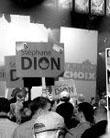 Whatever happens a little further down the road, it will also remain true that Stephen Harper is no Pierre Elliott Trudeau. However long Mr. Harper manages to hang onto the new job he likes so much, there will still be lots of room for Sophie Gregoire’s apparent mission to keep the Canadian spiritual legacy of Pierre Trudeau alive for future generations, who will have to “stand on guard” and “Protgera nos foyers et nos droits.”
Whatever happens a little further down the road, it will also remain true that Stephen Harper is no Pierre Elliott Trudeau. However long Mr. Harper manages to hang onto the new job he likes so much, there will still be lots of room for Sophie Gregoire’s apparent mission to keep the Canadian spiritual legacy of Pierre Trudeau alive for future generations, who will have to “stand on guard” and “Protgera nos foyers et nos droits.”
Many things about Pierre Trudeau were annoying, and some were highly impractical. But, on his very best days, something about him projected a kind of magic and a strong and deep upbeat feeling about the country. Stephen Harper has nothing like this to offer the Canadian people – as the recent birth of Pierre Trudeau’s grandson Pierre in a Montreal hospital somehow makes clear.
At the same time, the biggest nightmare of the Liberal Party of Canada today is that there are moments when it almost seems that Stephen Harper could have at least some of the makings of another William Lyon Mackenzie King – only this time on the wrong side of the traditional ideological divide. His January 4, 2007 cabinet shuffle had a few vague hints of all this.
 We mere voters can only wait and see what the future will bring. And it is no doubt also worth remembering that Stephane Dion and his new Liberal team still have a few fresh cards and lots of old ones themselves. So far they haven’t played any of them wrong. M. Dion is no Pierre Trudeau either. But for the moment he is stressing his more team-centred style of leadership, and we the Canadian people seem to admire and respect that kind of thing quite a lot too.
We mere voters can only wait and see what the future will bring. And it is no doubt also worth remembering that Stephane Dion and his new Liberal team still have a few fresh cards and lots of old ones themselves. So far they haven’t played any of them wrong. M. Dion is no Pierre Trudeau either. But for the moment he is stressing his more team-centred style of leadership, and we the Canadian people seem to admire and respect that kind of thing quite a lot too.
Demographically, and in virtually all regions if not quite provinces, Canada is almost certainly still more of a liberal than a conservative place. And the radical right wing Mr. Harper identified with in his youth does seem to be fading in the larger global village (and especially in the friendly USA next door?). Stephen Harper is probably going to have to be very clever to keep his current job, let alone get promoted to a better one at the head of a majority government. What the polls still seem to be saying is that he still hasn’t proved to enough of us that he is that clever yet.
January 2, 2007: The counterweights editors on … WHERE IS CANADA GOING IN 2007 .. the Constitution if necessary but not necessarily the Constitution?
 Not even Canadians are especially interested in the endless question of what Canada is and where it is going in the new year that lies ahead. But, here as elsewhere, you don’t have to be a weatherman to tell that the climate is changing, at least somewhat.
Not even Canadians are especially interested in the endless question of what Canada is and where it is going in the new year that lies ahead. But, here as elsewhere, you don’t have to be a weatherman to tell that the climate is changing, at least somewhat.
As has been urged, yet another federal election in 2007 does not make a lot of sense. However, Canadian politicians of all hues still seem committed to party strategies that may make it necessary. Meanwhile, certain (ugh) old constitutional issues have returned to a back corner of the table. No politicians want to go down this road either, but vague early nudging in that general direction may be necessary too. (Or, even better, instead?) The only strategy for we Canadian voters just seems to be to enjoy whatever happens as much as we can, on the real reality TV.
Does anyone still remember who Diefenbaker and Pearson were?
 By the end of 2006 it at least seemed to be clear that the late 1950s and early 1960s in Ottawa are not going to repeat themselves exactly.
By the end of 2006 it at least seemed to be clear that the late 1950s and early 1960s in Ottawa are not going to repeat themselves exactly.
In the federal election of June 10, 1957 John Diefenbaker from Western Canada (Saskatchewan, though born in Ontario) led the Conservatives to a very slender minority government – in the first defeat of the Liberal Party of Canada since July 28, 1930. (The Liberals had won all the subsequent elections of 1935, 1940, 1945, 1949, and 1953 handily enough.)
The minority parliament elected in 1957 proved unable to settle down to any serious conduct of the nation’s business (especially after the party election of the new Liberal leader Lester Pearson). Less than 10 months later another general election was held, on March 31, 1958. And (thanks in part to help from the premier of Quebec, Maurice Duplessis) the Diefenbaker Conservatives won the largest parliamentary majority in Canadian federal political history.
 (The story of the following 10 years is worth recalling quickly too. On June 18, 1962 the Diefenbaker Conservatives managed only another minority government. By this time, among other things, Duplessis was dead and a new Quiet Revolution was underway in Quebec. In Ottawa Diefenbaker’s second Conservative minority government only lasted until April 8, 1963, when Lester Pearson won his first Liberal minority government. On advice from his backroom strategic gurus, Pearson tried to get a majority in yet another election on November 8, 1965. He didn’t quite make it, but carried on anyway in progressive new directions – from a Canadian flag at last to public pension plans and health care, backed frequently by Tommy Douglas’s new New Democratic Party. Then, in the election of June 25, 1968, the charismatic Pierre Trudeau finally restored the Liberal majority government that had been lost in 1957.)
(The story of the following 10 years is worth recalling quickly too. On June 18, 1962 the Diefenbaker Conservatives managed only another minority government. By this time, among other things, Duplessis was dead and a new Quiet Revolution was underway in Quebec. In Ottawa Diefenbaker’s second Conservative minority government only lasted until April 8, 1963, when Lester Pearson won his first Liberal minority government. On advice from his backroom strategic gurus, Pearson tried to get a majority in yet another election on November 8, 1965. He didn’t quite make it, but carried on anyway in progressive new directions – from a Canadian flag at last to public pension plans and health care, backed frequently by Tommy Douglas’s new New Democratic Party. Then, in the election of June 25, 1968, the charismatic Pierre Trudeau finally restored the Liberal majority government that had been lost in 1957.)
 Back in the present, on January 23, 2006 Stephen Harper from Western Canada (Alberta, though also born in Ontario) led the Conservatives to another very slender minority government. Until the end of this past summer, the Harper Conservatives seemed to be focusing almost all their serious energy on the concept of some kind of at least formal repeat of Diefenbaker’s majority victory of 1958 – in another election no later than sometime in 2007. For a while there were even certain polling data that almost sustained this concept (especially when you remember that it is possible to win a majority of seats in Canada’s federal Parliament nowadays with as little as 40% of the cross-Canada popular vote).
Back in the present, on January 23, 2006 Stephen Harper from Western Canada (Alberta, though also born in Ontario) led the Conservatives to another very slender minority government. Until the end of this past summer, the Harper Conservatives seemed to be focusing almost all their serious energy on the concept of some kind of at least formal repeat of Diefenbaker’s majority victory of 1958 – in another election no later than sometime in 2007. For a while there were even certain polling data that almost sustained this concept (especially when you remember that it is possible to win a majority of seats in Canada’s federal Parliament nowadays with as little as 40% of the cross-Canada popular vote).
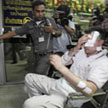 Yet by the time the autumn leaves were falling, no one but the most partisan Conservative zealots still altogether believed in the concept of almost any kind of Conservative majority government in another federal election quite soon. The Liberals now have a surprising new leader in Stephane Dion. The most recent polling data suggest that another election soon would just bring another minority government in another fractious Parliament. And it could even be a Liberal rather than a Conservative minority government. Stephen Harper’s own public thoughts, just before he settled into whatever it is that someone like him does over the year-end holiday season, appeared to be that he quite liked his new job as minority prime minister, and was not in any great hurry for another election soon himself at all.
Yet by the time the autumn leaves were falling, no one but the most partisan Conservative zealots still altogether believed in the concept of almost any kind of Conservative majority government in another federal election quite soon. The Liberals now have a surprising new leader in Stephane Dion. The most recent polling data suggest that another election soon would just bring another minority government in another fractious Parliament. And it could even be a Liberal rather than a Conservative minority government. Stephen Harper’s own public thoughts, just before he settled into whatever it is that someone like him does over the year-end holiday season, appeared to be that he quite liked his new job as minority prime minister, and was not in any great hurry for another election soon himself at all.
Kelowna Accord, Quebecois nation in united Canada, consultations with electors on their preferences for appointments to the Senate … and proportional representation, for real?
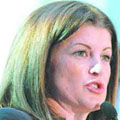 The biggest current fly in the ointment seems to be that if the Harper Conservatives put forth a budget sometime in, say, March 2007, which none of the opposition parties feel able to support (especially the Bloc and/or the Liberals), another federal election may prove unavoidable.
The biggest current fly in the ointment seems to be that if the Harper Conservatives put forth a budget sometime in, say, March 2007, which none of the opposition parties feel able to support (especially the Bloc and/or the Liberals), another federal election may prove unavoidable.
To further complicate matters, it has been said that “Premier Jean Charest is hinting that he’ll wait for the Conservative government’s next federal budget before calling a provincial election … The Liberal Premier is currently in the fourth year of his mandate and is expected to hold an election some time in 2007.” We know for a certainty too that Ontario will be holding its first “fixed-date” election on October 4, 2007. It is being said as well that this “Fixed date sends Ontario into year-long campaign” – beginning virtually right now. And then, to ice the cake, “Alberta’s new premier may also choose to seek a mandate before 2007 comes to an end.”
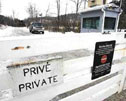 Meanwhile, along with such touted up and coming federal election issues as Afghanistan and the environment, the past year has apparently injected some form of fresh stirring into three big old constitutional issues from the failed Charlottetown Accord of 1992 – aboriginal rights and policy (as also in the late 2005 Kelowna Accord, on which the Harper government has turned its back), the federal parliamentary resolution on the Quebecois as a nation within a united Canada just this past November, and the Harper minority government’s new Bill C-43, a.k.a “An Act to provide for consultations with electors on their preferences for appointments to the Senate.”
Meanwhile, along with such touted up and coming federal election issues as Afghanistan and the environment, the past year has apparently injected some form of fresh stirring into three big old constitutional issues from the failed Charlottetown Accord of 1992 – aboriginal rights and policy (as also in the late 2005 Kelowna Accord, on which the Harper government has turned its back), the federal parliamentary resolution on the Quebecois as a nation within a united Canada just this past November, and the Harper minority government’s new Bill C-43, a.k.a “An Act to provide for consultations with electors on their preferences for appointments to the Senate.”
 It is somewhere around this point that feelings about imminent climate change of some sort and degree in Canadian federal politics start to acquire real traction in your mind. And Toronto Globe and Mail columnist John Ibbitson has recently spelled out some related variations on a similar theme: “The enduring presence of the Bloc Qubcois, the weakness of the Liberal Party in Western Canada and rural Ontario, and the equivalent weakness of the Conservative Party in the three big cities leave little hope for a future majority government … responsible politicians would work to ensure that minority Parliaments last, at the least, two years … Instead, this year’s crop of opposition leaders is openly conspiring to force an election, while the Tories continue to search for a breakthrough strategy in Quebec and urban Ontario … Unless Canadians can find a way to elect a majority government, we may have to shift to proportional representation to elect the House of Commons, in hopes of creating stable coalitions. “
It is somewhere around this point that feelings about imminent climate change of some sort and degree in Canadian federal politics start to acquire real traction in your mind. And Toronto Globe and Mail columnist John Ibbitson has recently spelled out some related variations on a similar theme: “The enduring presence of the Bloc Qubcois, the weakness of the Liberal Party in Western Canada and rural Ontario, and the equivalent weakness of the Conservative Party in the three big cities leave little hope for a future majority government … responsible politicians would work to ensure that minority Parliaments last, at the least, two years … Instead, this year’s crop of opposition leaders is openly conspiring to force an election, while the Tories continue to search for a breakthrough strategy in Quebec and urban Ontario … Unless Canadians can find a way to elect a majority government, we may have to shift to proportional representation to elect the House of Commons, in hopes of creating stable coalitions. “
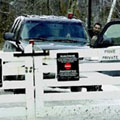 It is still not easy to know just what to make of talk of this sort at the moment. But what does seem increasingly possible (if still not exactly likely perhaps?) is that Canadian politics is lurching towards some kind of big new phase. It may even be that – as the always interesting Mr. Ibbitson almost seems to imply – Canadian politicians themselves will, like it or not, have to start coming to grips with various needs for “structural” change in the system at large. Nothing too risky or spectacular for the moment, by all means. And a key trick is no doubt to somehow promote a popular mood that has more constructive good humour and upbeat optimism about the future of the country than the last trip around the (ugh) constitutional block in 1992, etc …
It is still not easy to know just what to make of talk of this sort at the moment. But what does seem increasingly possible (if still not exactly likely perhaps?) is that Canadian politics is lurching towards some kind of big new phase. It may even be that – as the always interesting Mr. Ibbitson almost seems to imply – Canadian politicians themselves will, like it or not, have to start coming to grips with various needs for “structural” change in the system at large. Nothing too risky or spectacular for the moment, by all means. And a key trick is no doubt to somehow promote a popular mood that has more constructive good humour and upbeat optimism about the future of the country than the last trip around the (ugh) constitutional block in 1992, etc …
Whatever happens, it is starting to appear obvious enough that some of the structural and even ultimately constitutional problems of Canadian democratic politics today – which the country has been struggling with not all that badly for decades now – have reached a point where something further somehow needs to be done, in a serious enough way.
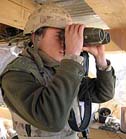 It even seems increasingly arguable that some fresh attention on structural and constitutional problems will be needed to finally facilitate the bolder action on a growing array of substantive issues, that the growth of the global village is laying in the lap of Mr. Harper’s emerging new Canadian energy superpower, and all that. (As a practical matter, e.g., Ottawa arguably can’t get too far with Stephane Dion’s brave new vision for environmental policy, without also gaining at least some further ground on, say, such a key constitutional issue as Senate reform.)
It even seems increasingly arguable that some fresh attention on structural and constitutional problems will be needed to finally facilitate the bolder action on a growing array of substantive issues, that the growth of the global village is laying in the lap of Mr. Harper’s emerging new Canadian energy superpower, and all that. (As a practical matter, e.g., Ottawa arguably can’t get too far with Stephane Dion’s brave new vision for environmental policy, without also gaining at least some further ground on, say, such a key constitutional issue as Senate reform.)
One way or another, 2007 may at least start to test just how ready, willing, and able both Canadian politicians and Canadian voters are to rise to a few big new challenges. And before the very last drop of holiday season good will fades from the returning routine altogether, in this as in all other respects, we might all raise a last glass to a happy and prosperous new year. Above all else, if we are going to get trapped in the swamp once again, like it or not, we might as well try to enjoy ourselves while we’re there.


[…] Where is Canada going .. does Pierre Trudeau’s new grandson have anything to do with it? – C…. Share this:TwitterFacebookLike this:Like Loading… May 9, 2013Justintrudeaumania2 […]